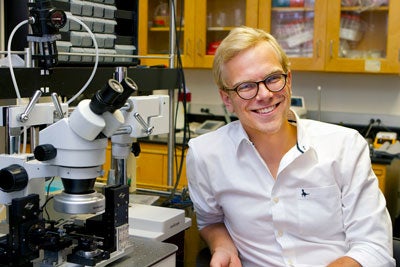Coursework Requirements

Ph.D. Program Curriculum
The curriculum is designed to provide students with a foundation on which they can build for specialization in any area of neuroscience. Moreover, all students are expected to be familiar with the different levels of analysis in neuroscience, from the molecular to the behavioral levels. The curriculum has six major components:
-
Core Courses. In the first year, students take four core courses that provide an introduction to neuroscience at the graduate level:
Cellular Neurophysiology (Fall)
Anatomy of the Central Nervous System (Winter)
Systems Neuroscience (Winter)
Cell, Developmental and Molecular Neurobiology (Spring) -
A 1st year seminar course in the fall quarter discusses current literature in conjunction with the Joint Seminars in Neuroscience, in the winter quarter focuses on current methods and hones persentation skills in the spring quarter
-
Individual Development Plan. All students are strongly urged to actively plan their career and to make sure that they are obtaining the necessary training to succeed. For this we require that students maintain an active Individual Development Plan. This plan can be altered at any time and should serve as a reminder that being in graduate school is a temporary phase and not a career choice by itself!
-
Laboratory Rotations. During the first year, students perform three
lab rotations to gain exposure to different approaches to neuroscience research. -
Literature-based Seminars. Students take five literature-based seminars during the first three years which emphasize critical analysis of current literature in neuroscience.
-
Advanced Elective Courses and Biotatistics. Students also complete at least 8 units of advanced elective courses relevant to their area of specialization in neuroscience in addition to graduate biostatistics and ethics from a pre-approved list of courses. Of note, one of the biostatistics course prefered by students is based on bootstrap statistics, involving a practical introduction to coding (see also point 9). Please contact the graduate office for the most recent list of approved elective courses. If you wish to petition an elective course that is not on this list, submit an elective course petition at least four-weeks before the course begins.
-
Teaching. Each student must serve as a paid teaching assistant in at least one undergraduate course.
-
Dissertation Research. The most important component in the Ph.D. Program is a long period of hands-on experience in neuroscience research, culminating in the Ph.D. Dissertation. The mentor-student relationship allows the student to develop the complex set of skills necessary to select interesting research problems, to plan and execute meaningful experiments, and to communicate the results effectively.
-
Computational Competence. The NSIDP strongly suggests that students strive to obtain computational competences indepedent of the field of study. Being able to analyse and interpret data using computational methods is a crucial part of being a scientist. We note that computational competance can be mastered at many levels . As part of the first week of orientation, all students will be introduced to the basics of coding through a tutorial given by the "Insitute for Quantitative and Computational Biology." The same resource provides many courses in coding in different languages and also offers collaborative help for projects through the 'Collaboratory.' A new course "Introduction to Signal Processing for Neuroscientists" will be offered by the NSIDP as an elective for the first time this year by NSIDP faculty Drs. Masmanidis and Suthana. NSIDP faculty Dr. Kao offers advanced courses such as "Neural Networks & Deep Learning." NSIDP Faculty Dr. Mehta offers "Neurophysics of the Brain and Mind problem". For students who need refreshers in linear algebra or matrices, we recommend many of the highly acclaimed courses offered at the undergraduate level. Many more specialized courses, seminars and clubs on this topic exist on campus.
MSTP students
The NSIDP welcomes MSTP students who want to obtain a PhD in Neuroscience after their second year of medical school. They will not be required to complete the entire core curriculum since they already completed extensive course training during medical school. We are currently evaluating the requirements, so please do contact us for details if you are considering joining the NSIDP.
During the first year of the doctoral program, students take the sequence of core courses, three literature-based seminars, and perform lab rotations. At the end of this first academic year, the student selects a faculty research mentor and joins a laboratory. The Written Qualifying Examination is completed at the beginning of the second year and students then focus mainly on laboratory work. Most students serve as teaching assistants in the second year. By the third year of study, students spend nearly full-time in the laboratory and form a thesis committee. The Oral Qualifying Examination (OQE) is taken no later than the end of the third year. This tests their ability to present and defend a research proposal. The OQE serves as unwritten agreement between students and their thesis committee on what constitutes a successful thesis. Students must meet at least yearly with their thesis committee. Students defend the completed dissertation in the Final Oral Examination, which consists of a student presentation (open to the general public) followed by an examination of the candidate by the thesis committee. The degree is conferred upon electronic submission of the thesis.
To view detailed information and the most current curriculum please visit the Graduate Division website for the official Neuroscience Graduate IDP Program Requirements.

